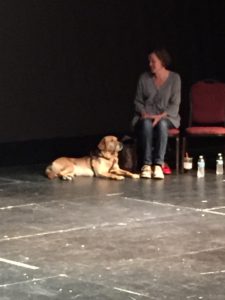A Theater Workshop That Puts Disability Center Stage
by Beth
A post I wrote about an accessible play writing class I took last summer that was geared to people with disabilities caught a blog readers eye. Or, I should say, his ears! Blog reader Bill Green has been legally blind since birth, and he was so intrigued by the idea that he signed up for the Spring 2017 course. Here he is with a guest blog about his experience in theater.
by Bill Green
The workshop I took with The Neo-Futurists this spring consisted entirely of disabled students. Everyone’s physical bodies and its limitations shape everyday experiences and interactions. No one is more acutely aware of these limitations and their influences as a disabled individual. This awareness became the core of many plays written by my fellow students and myself.
One of the fundamental tenets of The Neo-Futurist aesthetic is honesty. On stage, all performers are themselves, not characters. They portray moments, with all the humor and sorrow, from their experiences.
The workshop taught the two-minute play, a specialty of The Neo-Futurists. On the first day, we went around the room introducing ourselves. All of the other students had backgrounds in performance, were in shows, and had been paid for their performing. When it came time to introduce myself, I decided to leave out my only acting credit: Al Bo the cowboy in seventh grade.
The Neo-Futurist ensemble members who taught the class, Trevor and Jeewon, did an amazing job fostering a welcoming and comfortable environment. By the second week, we were already performing monologues that blended current events, personal experience, and a routine task. I delivered a piece about vision loss, the space program, and climate change all while dribbling a basketball. Others performed with great energy and emotion. I admired how we all stayed true to honest performance.
People shared vulnerable and daring moments from their own lives. Over the following weeks, we created more two-minute plays and participated in exercises to generate ideas. We created more monologues and ensemble pieces. Even when pieces fell short of our own goals, the class stayed constructive and positive. No idea, as long as it was honest, was too ridiculous or invalid.
The process of creating two-minute plays started with an assignment, writing at home over the next week, and then performing and workshopping our plays with the class. All that work lead to a May 1, 2017 performance on stage at Chicago’s Victory Garden Theater.
I had three of my own plays to perform. The first was the monologue using the basketball that ended with me shooting the ball into a trashcan. I also did a deconstruction of George Orwell’s 1984 using a volunteer from the audience to play a rigged game of Three Card Monte. Finally, I told the story of how I met my wife in the form of a children’s story time.
These plays gave me the chance to show and share in a concrete way what it’s like to interact with a world that is only partly seen. Only two of my plays used my visual impairment as a focus, but other students’ plays explored dealing with hearing loss, strangers’ reactions to leg braces and dealing with the stares and comments you get when living with Albinism. We found ways to create empathy with the audience.
In the end, besides the joy of working with such talented men and women, the reward of the workshop was the ability to be honest.
More posts about disability and theater:
Taking the stage — stories about life with disability
People with Disabilities Take the Stage Tomorrow at Chicago’s Victory Gardens Theater







